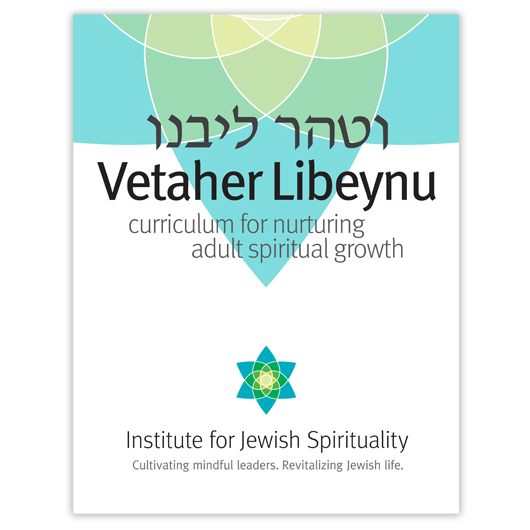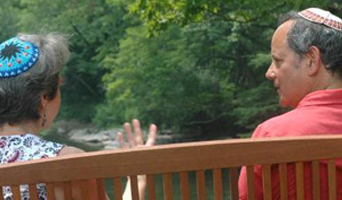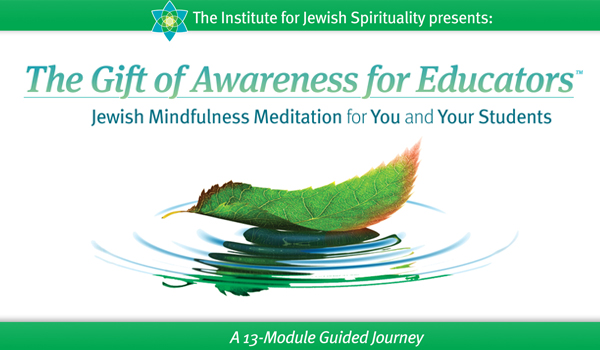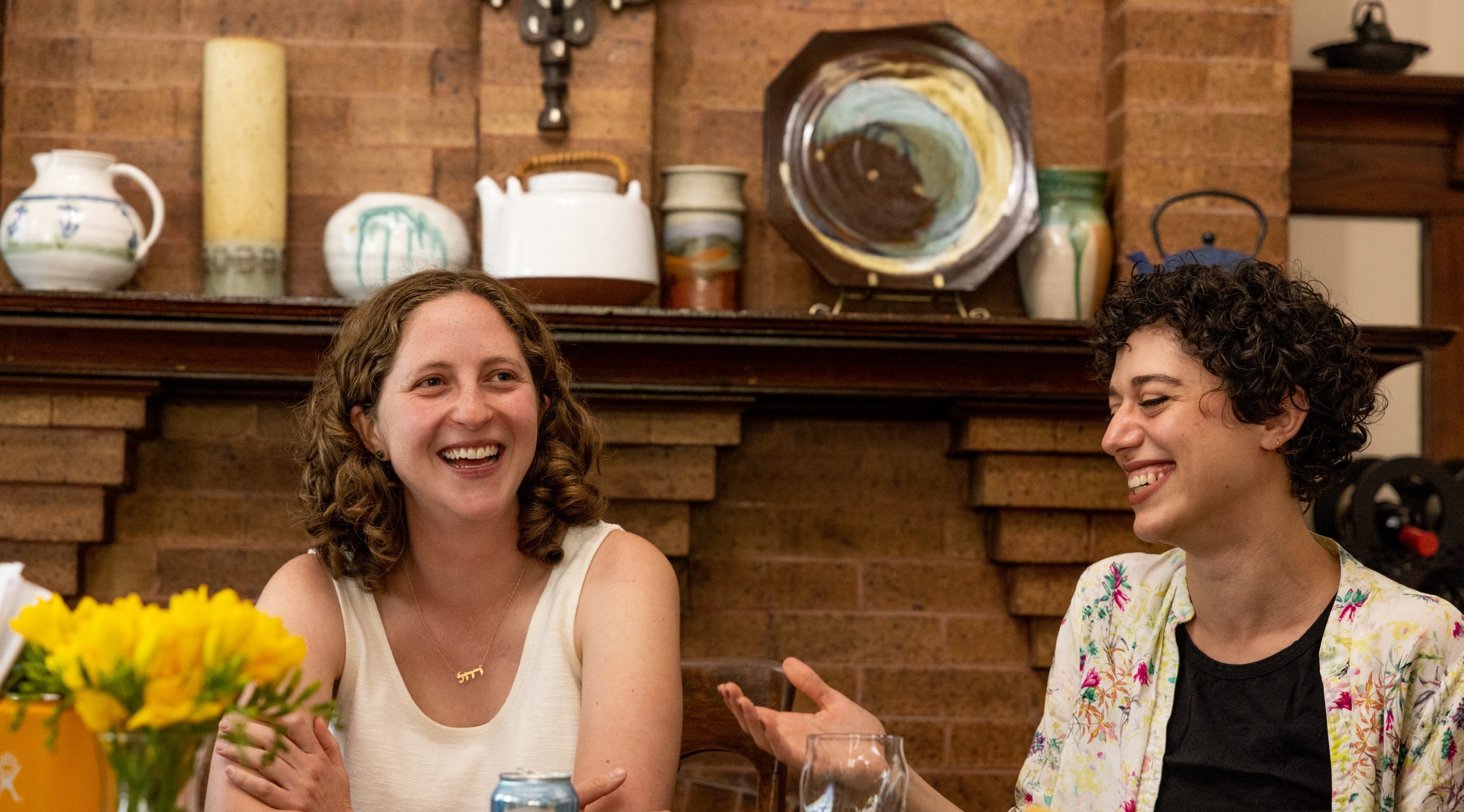The Gift of Awareness for Educators
Jewish Mindfulness Meditation for You and Your Students
A 13-Module Guided Journey
Discover how to bring more resiliency, empathy and connection to Judaism to your students, and you! Join Rabbi Sam Feinsmith and Rabbi Jordan Bendat-Appell as they expertly guide you through establishing a Jewish mindfulness meditation practice that can support you in showing up non-reactively and non-judgementally in your life and the classroom, finding an anchor of peace and positivity in stressful situations, and being a powerful example of resiliency, empathy, and connection.
Educating for a Jewish Spiritual Life
For Jewish Schools and Organizations to Nurture the Spiritual Capabilities of Jewish Youth
EJSL is a three-semester, professional development program that provides educators with concrete ways to teach students to become spiritual seekers and makers of meaningful lives. It invites a deeper connection to and joy in Judaism as a pathway for engaged living and lifelong growth.
The program starts by building fundamental meditation skills, which underlie the teachings of the next two semesters: tikkun middot (positive character attributes), and contemplative tefillah (prayer).
Each semester begins with an in-person, half-day professional development workshop. Following the workshop, educators who want to further pursue Jewish mindfulness in the classroom enroll in an online, on-demand self-study course that comes with webinars, a discussion forum, journaling, and email access to an IJS coach.

The Prayer Project Curriculum
Bring a Prayer Project module to your community
These 30-day modules are designed to help you focus on cultivating a specific modality of prayer practice. With weekly half-hour video teachings from our master teachers, written lessons, Jewish texts, secular writings, poems, music, videos, and other references to supplement learning, these modules will encourage your community to engage a richer and more meaningful prayer practice.
Contact Sam Feinsmith for more information
Past Text Studies
The materials for each of the prior Text Studies can be purchased as a digital download for $240.
Please see the descriptions below, and click here to purchase them.
Torah Study for the Soul: Hasidic Text Studies
Degel Mechaneh Efrayim with Sam Feinsmith
The teachings of R. Moshe Chayim Efrayim of Sudylkov (1748-1800), the grandson of the Baal Shem Tov. He found that mindful Torah study is a devotional practice that can yield fresh insights into the mysteries of the inner life. As such, his teachings provide a framework for studying Torah in a manner that clarifies and cultivates the inner terrain to discover the divine spark within and draw clarity and insight from the divine inner well.
Me’or Eynayim with Jonathan Slater
The teachings of R. Menachem Nachum of Chernobyl (1730-1797).
R. Menachem Nachum was a student of R. Dov Baer, the Maggid of Mezritch, and likely also knew the Baal Sham Tov. His teachings, published first in 1798, are studied broadly within the Hasidic world, and echo deeply the spiritual orientation of the Baal Shem Tov.
Ma’or Vashemesh with Jonathan Slater
The teachings of R. Kalonymus Kalman Epstein of Krakow (1754-1823).
He was a student of R. Elimelekh of Lyzhansk. While the youngest in his circle, he was recognized as R. Elimelekh’s prime pupil (serving also as his personal assistant/shamash). His teachings, published first in 1842, are studied broadly within the Hasidic world, and offer insights into the emergence of Hasidism in Poland in the early 19th century.
Degel Machaneh Efrayim with Jonathan Slater
The teachings of R. Moshe Chayim Efrayim of Sudylkov (1748-1800).
He was significantly influenced by his grandfather, but also studied with R. Dov Ber, the Maggid of Mezritch, and R. Yaakov Yosef of Polonnoye. His book is a rich source of the Baal Shem Tov’s teachings.
Kedushat Levi with Jonathan Slater
The teachings of R. Levi Yitzhak of Berdichev (c. 1740-1810).
He was a distinguished pupil of Rabbi Dov Baer, the Maggid of Mezritch, and worked to expand the influence of Hasidism in Poland. His teachings were published first in Slavuta (1798) and then again in 1811, with additional material included from manuscripts by his sons. Kedushat Levi is one of the most popular and beloved Hasidic texts.
No’am Elimelekh with Jonathan Slater
The teachings of R. Elimelekh of Lyzhansk (1717-1787).
He was one of the leading students of R. Dov Baer, the Maggid of Mezritch. He is credited with bringing Hasidism to Poland, and promulgating the role of the Tzaddik as intermediary between heaven and earth. The Tzaddik, through his devotions, gained access to divine realms, and so could influence the divine will for the sake of his hasidim, providing “children, life and sustenance”.
Mei Hashilo’ach with Jonathan Slater
The teachings of R. Mordecai Yosef Lainer of Izbica (1801-1854).
He was a student of R. Simchah Bunim of Przysucha, and in turn of his colleague/teacher R. Menachem Mendel of Kotzk. His teachings are often considered radical in that he teaches that “all is in the hands of Heaven, including the fear of Heaven,” and so even those acts that we may consider to be sins today will ultimately be shown to have been in accord with the divine will.
Kol Simchah/Ohel Torah with Jonathan Slater
This series features teachings of R. Simchah Bunim of Przysucha (1765-1827) and his disciple R. Menachem Mendel of Kotzk (1787-1859).
R. Simchah Bunim had a career as an apothecary, and lived in the west before becoming a rebbe, which influenced his teachings, distinguished from mainstream Hasidic thought. The Kotzker developed this style even further, demanding radical truth-telling to be able to stand before God.
Netivot Shalom with Jonathan Slater
The teachings of R. Shalom Noach Berezovsky of Slonim (1911-2000).
Born in Baranovitsh (Belarus), he moved to Palestine in the mid-1930’s. He served as the head of a Chabad yeshivah, ultimately creating a Slonimer yeshivah in Jerusalem. He is well known as an educator, and Netivot Shalom is studied outside of the Hasidic community and by non-Orthodox Jews around the world. His teachings reflect an awareness of contemporary issues in Israel of the 1980’s and beyond, and promote a pure spirituality of devotion and service.
Birkat Avraham with Jonathan Slater
The teachings of R. Avraham Weinberg (the third) of Slonim (1889-1981).
He was the great-grandson of R. Avraham Weinberg (the founder of the Slonim lineage) and served as rebbe of the community in Jerusalem from 1954-1981. For this series, we selected those teachings in which R. Avraham read a part of the weekly portion through Ps. 69:14: “As for me, may my prayer to you be in a favorable moment; O God, in your great love, answer me with your saving truth”.
Iturei Torah with Jonathan Slater
Rabbi Aharon Yaakov Greenberg (1902-1963).
He was born in Sokolow, Poland, and grew up in the traditional practices of Hasidism, with an emphasis on Talmud study. He eventually became the head of a yeshivah in Sokolow, while also being involved in the Po’el Mizrachi Orthodox Zionist Labor movement. He worked for the Jewish Agency, attending the United Nations, and lobbying for the establishment of the Jewish state. Iturei Torah is an anthology of teachings drawn from classical Torah commentators and rabbinic sources, medieval teachers and Hasidic masters.
Mindfulness Text Studies
Connecting Inner and Outer Worlds: Mindfulness, Torah, and Social Justice By Rabbi Rachel Goldenberg
One of the things we learn through mindfulness practice that ultimately, there is no separation between inner and outer worlds, and that inner work inevitably becomes outer work. Rabbi Rachel Goldenberg shares a teaching on the weekly Torah portion to make the connection between our inner spiritual practice and the work that our practice leads us to do in the world. Each teaching includes instructions for mindfulness practice, guiding participants to gain awareness of those inner habits of mind and heart that mirror the patterns in the world that we seek to transform. Instructions and teachings draws out the Torah’s wisdom when it comes to discovering the heart’s boundless capacity for compassion.
Pitchei Ha-Levavot (Heart Openings) with Rabbis Marc Margolius and Pamela Wax
Explores the Torah portion by focusing on the integration of mindfulness practice and close attention to middot, core spiritual/ethical qualities. On alternating weeks, Rabbi Marc Margolius and Rabbi Pamela Wax highlight and explore specific teachings arising from the text, to help us grow in awareness, cultivate wisdom, and strive to be our best selves on a daily basis. Drawing from classic Mussar commentators as well as other sources, this study offers an overview of middot-related themes arising in each parashah, delving more deeply into at least one particular middah or Mussar lesson each week which can inform our spiritual practice and enhance our daily lives. includes specific practices and reflections to support us in our daily spiritual practice.
Silent Center of Things: A Weekly Mindfulness-based Torah Study with Yael Shy
Yael looks at how the parashah touches on themes of struggle, awakening, loneliness, connection, community, joy, and love. Utilizing the work of scholars like Rabbi Abraham Joshua Heschel, Rabbi Abraham Isaac Kook, Aviva Zornberg, and others, as well as wisdom from mindfulness, poetry, psychology, and popular culture, this program delves deeply into the text, finding direct application to our everyday lives. Finally, Yael offers mindfulness and meditative practices along the journey to support us in our daily practices.
Journeying with the Soul: Torah Study and Practice with Rabbi Yael Levy
Yael offers mindfulness teachings based on the Torah portion, questions for reflection, and suggestions for practice. We honor Torah as “a Tree of Life” that nurtures our souls and expands our capacity for compassion, graciousness and right action.
Questions this program explores include:
What does the Torah portion reveal about the blessings, truths and challenges of lives?
What instruction does the Torah give for how to live well in relationship with ourselves and each other?
How does the Torah anchor us in Jewish time?
Where can we find ourselves in the stories of our people?
What instruction can be gleaned from the Torah for how to live with awareness, honesty and compassion?
Vetaher Libeynu “Purify our Hearts”: A Curriculum for Nurturing Jewish Spiritual Practice

Vetaher Libeynu (VL) is a newly updated IJS curriculum for fostering adult Jewish spiritual exploration and growth through study, prayer, and Jewish mindfulness meditation. Comprehensive yet flexible, the program is designed for use in small groups led by one or two facilitators, and is ideal for Jewish leaders looking for a rich offering for their adult education programs or hoping to deepen an existing spiritual practice community. The primary topics include:
• The Nature and Experience of Prayer
• Entering into Jewish Spiritual Practice
• God-Talk, God Belief, and God Experience
• Talmud Torah as a Mindfulness Practice
• Living a Life of Practice
The outline for each day-long session (which can be broken into three to six shorter sessions for more frequent group meetings) includes (1) an overview of the session, with goals, objectives and structure; (2) background readings for teacher-facilitators; (3) texts and materials for discussion, discussion questions, leader’s guide with commentary; (4) suggestions relating to teaching and practice, as well as relevant group dynamics; and (5) chevruta (study partner) materials with discussion questions for the following month. Two of the sessions contain additional material suitable for use during a shabbaton or retreat.

Mindfulness & Tikkun Middot Project for Jewish Organizations
The Tikkun Middot Project (TMP) supports the ongoing character development of staff and members in Jewish communities led by Institute-trained leaders, through mindfulness practice and tikkun middot, the cultivation of moral traits (such as patience, compassion, trust, and mindful speech).
In addition to working on their own character development, community leaders are strategically infusing middot practice throughout as many facets of their community’s culture as possible. For example, pilot communities have integrated awareness of the middot into worship, adult and children’s education, committee and board meetings, social justice work, and cultural programming.
TMP is directed by Rabbi Marc Margolius, Senior Program Director at IJS. The project utilizes a pilot curriculum authored by Boston-based Rabbi David Jaffe, as well as a parent-child curriculum designed by the late Miki Young, a Philadelphia-based spiritual teacher and educator. Dr. Tobin Belzer of the University of Southern California evaluated the project.



